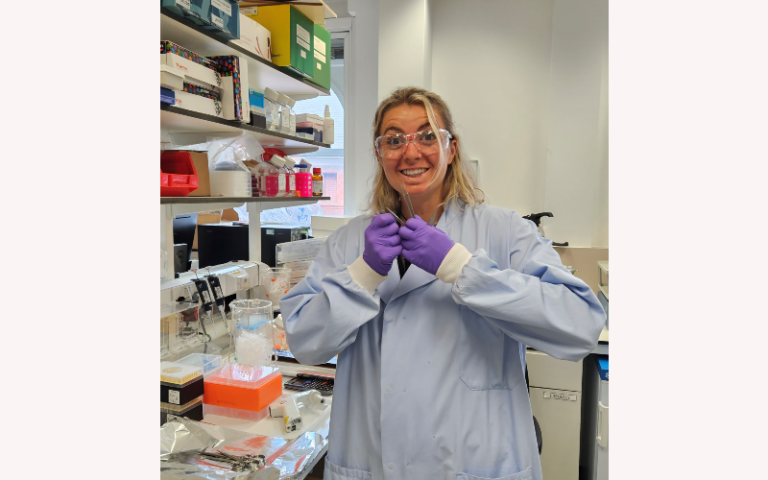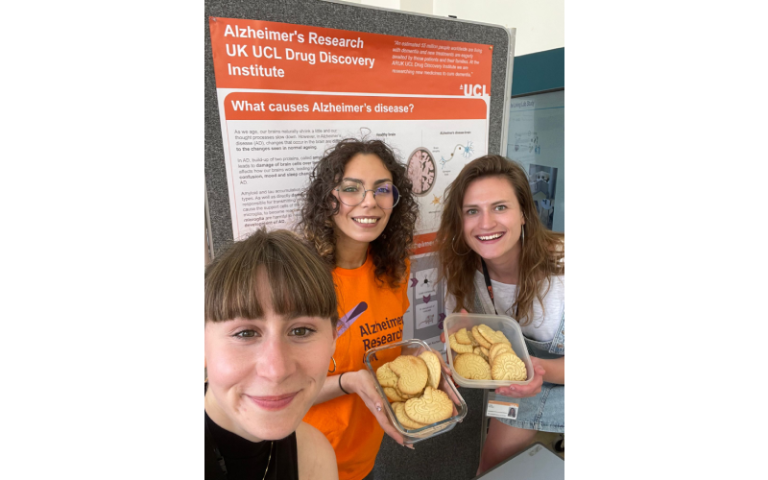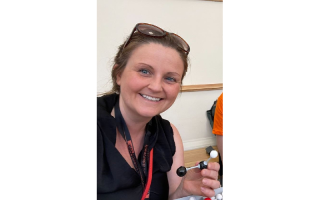Professor Fiona Ducotterd is the Chief Scientific Officer of the Alzheimer’s Research UK (ARUK) Drug Discovery Institute (UDDI) at UCL
Professor Fiona Ducotterd is the Chief Scientific Officer of the Alzheimer’s Research UK (ARUK) Drug Discovery Institute at UCL (UDDI). The UDDI has pharmaceutical industry standard drug discovery capabilities in Medicinal Chemistry, High Throughput Screening and Pharmacology and Biology translating cutting-edge academic innovations into therapeutics for neurodegenerative diseases. The UDDI labs will relocate from the Cruciform building to the new, purpose-built Grays Inn Road UCL Neuroscience facility (GIR) in 2024.

ARUK Drug Discovery Institute at UCL
There are almost 30 people in the UDDI team, including students and trainees, postdoctoral scientists, and industry experts.
‘The combination of talents is the UDDI superpower’, says Fiona. ‘Making medicines is a complex and multidisciplinary process and a collaborative, team-focused mindset is critical to our success. In drug discovery and development, we need to know who to ask for help, and when and how to identify the right experts – that is a skill we embed in our team from the start.’
The UDDI model is to find small molecule drug candidates for well validated therapeutic targets with actionable translational plans to move them into clinical trials and then partner with industry or spin out new companies for development. The first UDDI spin out, Astronautx, was founded in 2019. The UDDI uses the same precision and methodology as any pharmaceutical or biotechnology company, with the freedom to work on any potential drug targets the scientific data supports - we decide our own strategy and can truly follow the science!
An essential part of the DDI is creating long lasting relationships with investors and creating mutually beneficial partnerships where everyone works together to further the mission to cure Alzheimer’s.“An essential part of the DDI is creating long lasting relationships with investors and creating mutually beneficial partnerships where everyone works together to further the mission to cure Alzheimer’s.
We work with academic innovators within UCL and beyond to build translational drug discovery projects around promising drug targets. The new centre on Grays Inn Road will enhance our collaborative working as we will be in the same space with UCL and UKDRI colleagues – we can’t wait to occupy the world class and unique, integrated facility.
“Drug discovery is a long and challenging process. It’s vital that we have clear goals, so we can focus on projects with the best chances of success because patients are waiting.
‘We are here to discuss new ideas so please contact us if you are interested in building drug discovery projects. We are happy to share our industry expertise and capabilities to move projects to patients,’ says Fiona.

Oona Hinshelwood from the ARUK Drug Discovery Unit at UCL prepping tools for tissue dissection
Our partnership with ARUK is unique and enabling. The charity supports our work both financially and technically, and provides us with real patient insights that are an inspiring reminder of why we are here. The ARUK Drug Discovery Alliance (DDA) with Cambridge and Oxford DDIs is the largest network of preclinical neuroscience drug discovery experts in the UK, maybe the world. The ARUK advisory board of industry experts provide expert input and keep us focused on the critical path to deliver medicines. Drug discovery is a long and challenging process. It’s vital that we have clear goals and focus on projects with the best chances of success because patients are waiting.
Our project portfolio spans proteins or mechanisms involved in specific neurodegenerative diseases including Alzheimer’s and other dementias, Parkinson’s, Motor neurone, Huntington’s. We apply a variety of model systems, including parental cell lines, over-expressing cell lines, primary rat astrocytes and microglia, and disease-model iPSCs and animal models for screening and secondary and tertiary assays and have screened over 20 drug targets to date. Our chemistry teams runs iterative design and synthesis to find selective and on target lead compounds with good in vivo and drug like properties.
Our high throughput screening platform uses automation and robotics to handle up to millions of chemicals to look for ones that hit our targets. We have incorporated liquid handling machines, like the ECHO and Integra, Opera Phenix and Seahorse and Pherastar plate readers to progress from early stage to development to Hit-To-Lead screening as efficiently as possible. Our goal at GIR is to screen more targets and build more projects that can translate to patient benefit
.

Susannah Baird from the ARUK Drug Discovery Institute at UCL performing a screening assay
Beyond screening, we build assays and platform technologies to test and compare compound efficacy on a target specific basis that include live cell imaging and multi-electrode array (MEA) assays and CRISPR platform to knock-down target proteins in primary rat astrocytes.

 Close
Close


